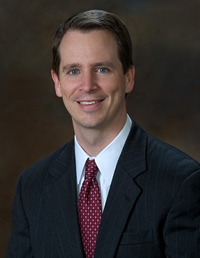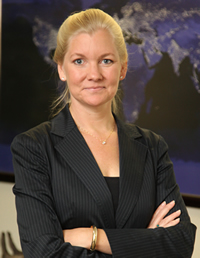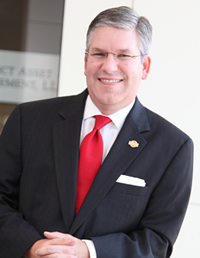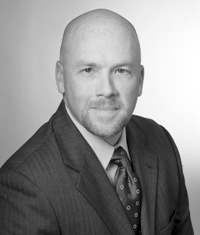Cougar Fund Gave Alumni Tools to Excel in Investment
Decade of Success in Cougar Fund Highlighted by Alumni Achievements
Published on June 14, 2010




The Cougar Fund was a valuable educational investment for successful alumni, from top, Sam McGee (MBA ’01), Whitney Randolph (MS FINA ’01), Trey Wilkinson (’92, MBA ’02) and Jay Warwick
Four of the students who ran the Cougar Fund the year it was born a decade ago have made their mark in the investing business.
All of them say the experience of working on the fund while earning master’s degrees at the C. T. Bauer College of Business at the University of Houston played an important role in helping them get into the business, and get ahead during trying times.
Sam McGee (MBA ’01) enrolled at Bauer College hoping a master’s degree would help him move from bank lending into investing. He signed up for the fund after a short speech by Professor Rich Pettit looking for volunteers in a finance class interested in running a student investment fund.
“That was probably a little bit of blind luck,” said McGee, one of four partners who recently started Avondale Wealth Management, a registered investment advisory firm in Dallas. “It allowed me to establish key relationships to get into the industry.”
Whitney Randolph (MS FINA ’01), a Senior Vice President with U.S. Trust, Bank of America Private Wealth Management, said it provided a lasting perspective on value.
“Managing money is a constant state of problem solving,” Randolph said. “Working on the Cougar Fund was great training on the fundamentals of what drives valuation – the bricks and mortar of investing and capital markets.”
Trey Wilkinson (’92, MBA ’02), President of Select Asset Management in Houston, said the lessons learned went beyond stock picking:
“The way the fund is structured, you get to work within the team. Very few portfolio managers work in a vacuum,” Wilkinson said. “You learn to make your arguments and make decisions as a group. That’s a valuable experience.”
When Jay Warwick, an executive director and portfolio manager with Van Kampen Investments, went looking for a job in the business, the experience opened doors.
“It gave me an opportunity to get into this side of the business,” Warwick said. “These jobs are highly prized; there are not that many of them, especially in Houston.”
A constant urge for many of those who work on the Cougar Fund has been the desire to become professional investors.
The careers of the four who did so from the inaugural year show how plans evolve over time.
McGee and Wilkinson now are principals in boutique firms after working within bank trust departments managing the assets of wealthy bank customers.
Warwick moved to Van Kampen Investments for the opportunity to be part of the team running the Comstock fund. His role is creating separately managed accounts, chosen from the stocks held by the investment company flagship mutual fund. Van Kampen has been bought by Invesco, which owns the AIM funds — his former employer.
Randolph established a partnership within U.S. Trust to manage money for “ultra-high net worth” families and foundations, which have investment assets of $30 million or more.
“This program has attracted very talented students from the start,” said Tom George, the finance professor who advises the fund. “These four are stand-outs, but there are more following in their footsteps.”
He also pointed out the experience has proven valuable for those on other career paths.
Many of those running the fund are established in other professions, like engineering, they are likely to stick with. For them, changing careers could mean a pay cut in the short run, while the skills they pick up working on the fund may ultimately help them advance in their established fields.
The Cougar Fund stands out as one of the few student-run funds that manage money from investors. But in the first year, no money was involved. It was decided the students needed to prove to investors they were capable money managers, by trading a simulated portfolio of stocks. And they delivered.
“That history was necessary to get investors confident enough for the student to manage real money,” said Pettit, who shepherded the funds until he retired in 2007. “All four of those people worked hard at it and did well at it.”
The bear market at the start of the decade was just the introductory lesson in a decade of extreme markets.
“9/11 happened. Coming out of that was the bull market of ‘03, the credit bubble and credit crisis. I’ve gotten to see a lot of different markets in my time,” McGee said. To be successful in money management: “You have got to lose a little hair and have some grey.”